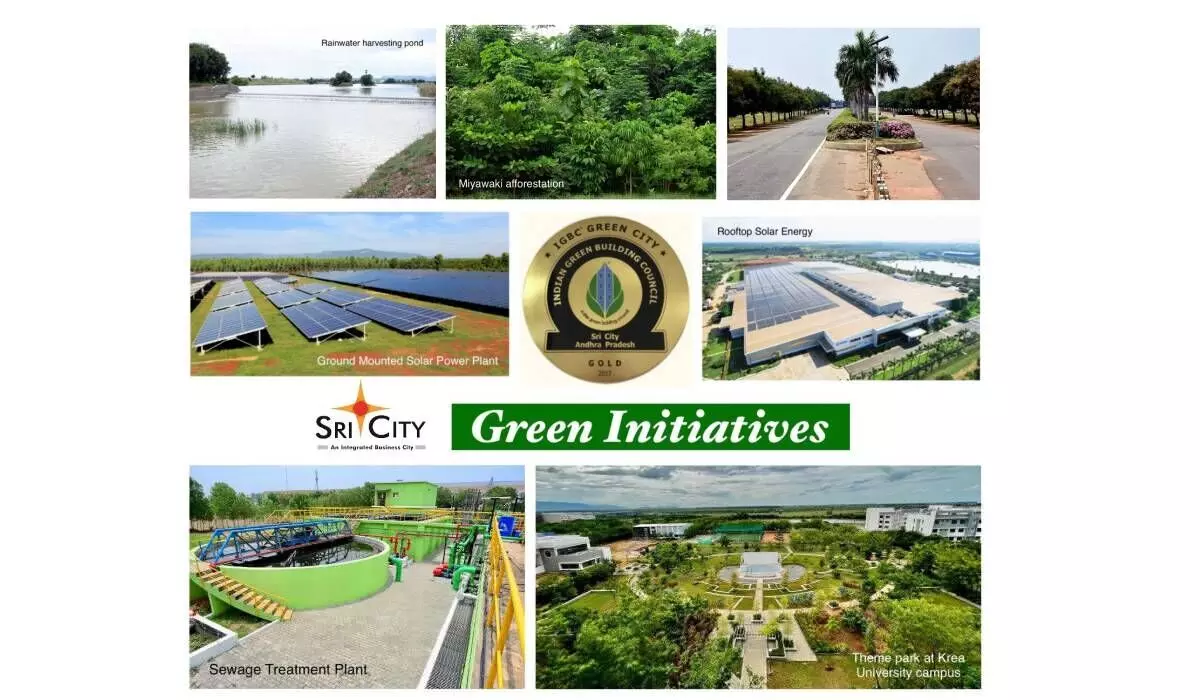A Green Step In The Right Direction
Sustainability significantly improves the quality of life, bringing about socio-economic prosperity, environmental protection, and preservation of natural resources. Sri City was developed with the idea of sustainable development in mind and aims to become a carbon neutral city and one of the best places in India to live and work in. - Dr Ravindra Sannareddy, Founder Managing Director, Sri City
image for illustrative purpose

Sri City Sri City, an internationally acclaimed integrated business city located in Tirupati District of Andhra Pradesh, has been actively implementing various sustainable practices since its inception in 2008. It has been built on the concept of sustainability with a mission to emerge as a ‘clean, green, breathe-easy’ industrial-urban agglomeration, founded on the tenets of ‘work, live, learn, and play’. Sri City has implemented green programmes and practices with an emphasis on maintaining a balance between industrial expansion and environmental preservation that has allowed the park to operate, while protecting the ecosystem. Sri City aims to achieve its objective of being the first carbon-neutral manufacturing zone in India.
Dr Ravindra Sannareddy, Founder Managing Director, Sri City, says: “Sustainability significantly improves the quality of life, bringing about socio-economic prosperity, environmental protection, and preservation of natural resources. Sri City was developed with the idea of sustainable development in mind and aims to become a carbon neutral city and one of the best places in India to live and work in.”
The design and construction of buildings in Sri City includes aspects that reduce emissions, waste production and resource utilisation. Power generated at the 6 MW internal solar power plant is supplied to the grid or to customers looking for renewable energy sources. Standalone independent solar streetlights are installed in the city. Electric vehicles are encouraged and have long been noticeable in Sri City, meeting both transportation and utility conveyance requirements.
Sri City has a special focus on waste and water management, with single use plastic products banned and campaigns to end their usage. The Industrial Park is devoid of red-category businesses, and all solid waste is managed scientifically. Bio-methanation is an example of the Circular Economy principle and three state of the art sewage treatment facilities ensure wastewater is cleaned up. Rainwater collection networks and ground water storage facilities provide 24x7 availability of piped water.
Sri City has planted close to a million trees, only endemic to the region. The Japanese 'Miyawaki' method of intensive afforestation is adopted to increase the density of green cover. Plantation drives are taken up on World Environment Day and special occasions, and the initiatives help regulate the city's temperature and air quality. Real-time weather and air quality monitoring stations are also operational 24 hours a day, seven days a week.
People are an important component of sustainable practices. The expansion of Sri City has resulted in significant socioeconomic growth in the surrounding region, with 95 per cent of the population now having a job. Income levels have more than doubled in the last 12 years, resulting in little crime, domestic violence, and workplace harassment of women. More than 50,000 people are working in 210 industrial units, with women accounting for more than half of the workforce. The establishment of skill development centres has resulted in a pool of 'industry ready' workforce.
Manufacturing plants in Sri City follow strict environmental and ecological practices, such as harvesting solar power, energy-saving industrial practices, and promoting gender equality. They also use renewables in their production processes, reducing waste creation significantly. All industries in Sri City have ample green cover in their premises.
Terming Sri City as ‘Green City’, Vijay Kumar GSRKR, former Secretary to government of AP, Environment, Forest, Science & Technology Department, said: “I am sure, with its active sustainability initiatives Sri City will soon emerge as a ‘model’ for other industrial parks in the state.” Prof Aradhana Agarwal, Copenhagen Business School, Denmark, praised Sri City's well-planned sustainability initiatives in her study report titled: ‘Towards Sustainable SEZs: Case study of Sri City Hybrid Zone’. M Srinivasulu Reddy, Chief Engineer, Telugu Ganga Project, Tirupati, commended Sri City's work in water management and rainwater harvesting, recognising their commitment to water sustainability.
Commenting on the awards that Sri City bagged for its commitment to sustainability, Satish Kamat, President (Operations), Sri City, says, “Our objective is to build a World Class Business Destination with a perfect synergy between industrial growth & sustainability. In recognition of our commitment we were bestowed with prestigious awards, including IGBC’s gold rating, Assocham’s Five GEMS grade and CII‘s twin awards for outstanding performance in both water management and rainwater harvesting. Additionally, we have an environmental management system that is ISO 14001 certified.”
Sri City's sustainability initiatives demonstrate a commitment to balance economic development with environmental responsibility and serve as a model for other industrial parks. These initiatives reduce the environmental impact of the park's operations and benefit the surrounding communities and ecosystems. Overall, Sri City's sustainability initiatives are a step in the right direction towards a greener and more sustainable future.

